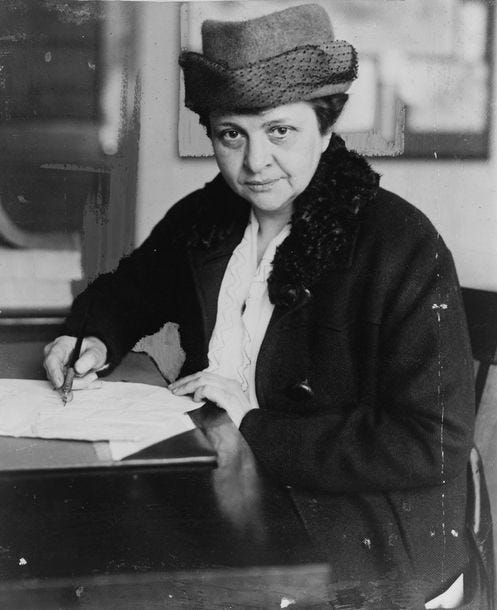On this Labor Day 2023, unions hit near record approval ratings. Labor champion Frances Perkins would be proud.
We Americans have common ground in our desire to be treated with dignity in the workplace and to share in the prosperity we work so hard to bring about.
Frances Perkins was the first women to serve in the Cabinet. She was FDR’s Labor Secretary for 12 years. In many ways, she led the battle against the great depression. She pushed for the laws that created fair labor standards and the right to organize into unions. She set up the Labor Standards Bureau. She was the architect of the Social Security Act.
She was deeply religious, and her faith told her that society and economics should create human dignity rather than destroy it. In 2009, the Episcopal Church’s General Convention established a fest day to honor her as a Public Servant and Prophetic Witness. Our first woman Cabinet member is also the only saint to have ever been a cabinet member.
By coincidence, 2009 was also the year that only 48 percent of Americans told the Gallup Organization’s pollsters that they approve of Labor Unions. Secretary Perkins would be pleased to know that today 67 percent of Americans now approve of unions. That’s down a bit from last year, but for the fifth year in a row, above its long-term average. This data comes from Gallup’s annual Work and Education Poll. (My brother, the Hollywood writer will be glad to know that Americans support the writers over the studios 72 to 19 percent.)
Frances Perkins served as Secretary of Labor in the Cabinet of President Franklin Roosevelt from 1933 to 1945. She was the first woman to hold a Cabinet position.
credit: Library of Congress
Labor’s Busy Year
It has been a busy year for organized Labor. So far this year, there have been 230 strikes involving 320,000 workers. That’s up from last year, which was up from the year before. As inconvenient as strikes are for consumers, instead of causing a backlash, the poll suggests Americans by large margins support these striking workers- whether they are writers or hotel workers or baristas.
Fairness in the face of America’s growing inequality seems to be top of mind. And, unlike nearly everything else, this is not a partisan thing. It seems we Americans have common ground in our desire to be treated with dignity in the workplace and to share in the prosperity we work so hard to bring about.
The AFL-CIO contracted with the public interest research firm GBAO to do its own poll. This one was limited to registered voters and found a slightly stronger support for unions, including a majority of those identifying themselves as Republicans. Unions’ biggest supporters? Young people. According to the data, 88 percent of those under 30 support unions, and 90 percent of them support the strikes.
The Positive Impact of Labor Unions
The renewed public support for unions got a boost this week, not from the Labor Department, but from Treasury. The Treasury Department is the one we think of as concerned with money, and banking, and the economy. So it was surprising to read their new report, Labor Unions and the Middle Class. They examined data on unionization, employment, productivity, wages and benefits, and demographics. Their findings are summarized in four areas.
First, workers reap substantial benefits from unionization. There’s a 10 to 15 percent wage difference in favor of union workers. Second, non-union workers see benefits as well because companies have to compete for talent. Third, the benefits of unionization are felt across all demographic groups. That was not always the case, but now increased unionization leads to benefits that are widely shared, and breaking old race and gender barriers. Finally, unions contribute to American economic growth and resilience. The do this by creating more consumer wealth, by reducing inequality, and by giving workers a bigger voice into decisions that improve workplace effectiveness.
After decades of middle-class erosion in America, The Treasury Department is clear. “This report,” they write, “describes how a policy of strengthening unions could slow or reverse some of the negative trends felt by the middle class and support broader economic growth.”
Biden is a Pro-Union President
President Biden is fully committed but Congress is, as ever, divided. Unionization is hard. People report that is difficult to find and to get into a union job. According to the Bureau of Labor Statistics, union membership was 10.1 percent of wage and salary workers in 2022, down from 10.3 percent in 2021. Policies that would make it easier to form a union, to get a union recognized, to negotiate a contract, these are the goals of the Protecting the Right to Organize Act- the PRO Act. Democrats have been trying to pass it. Business organizations hate it. The National Retail Federation calls it “the worst bill in Congress.” (Isn’t that what people say about those retail jobs?)
This Labor Day, enjoy the time with family. If you are in a city with a baseball team still in contention, be happy. But please, take some time to consider how fortunate you are to live in a time that matters, because now, the choices you make will resonate for years to come.
We face grave, but related, threats, and we must overcome them all. The immediate contest for our democracy, the decades long fight for workers, the epic battle for civil and reproductive rights, the historic struggle social progress, and the existential contest to protect our climate have converged upon our time. On one side is a determined minority, using the outsized power they hold through gerrymandered legislatures and a captured Supreme Court. On the other is a great coming together of Americans who will not let this radical minority impose their will upon the rest of us.
Somewhere, because of our determination, this Labor Day Frances Perkins is smiling.




